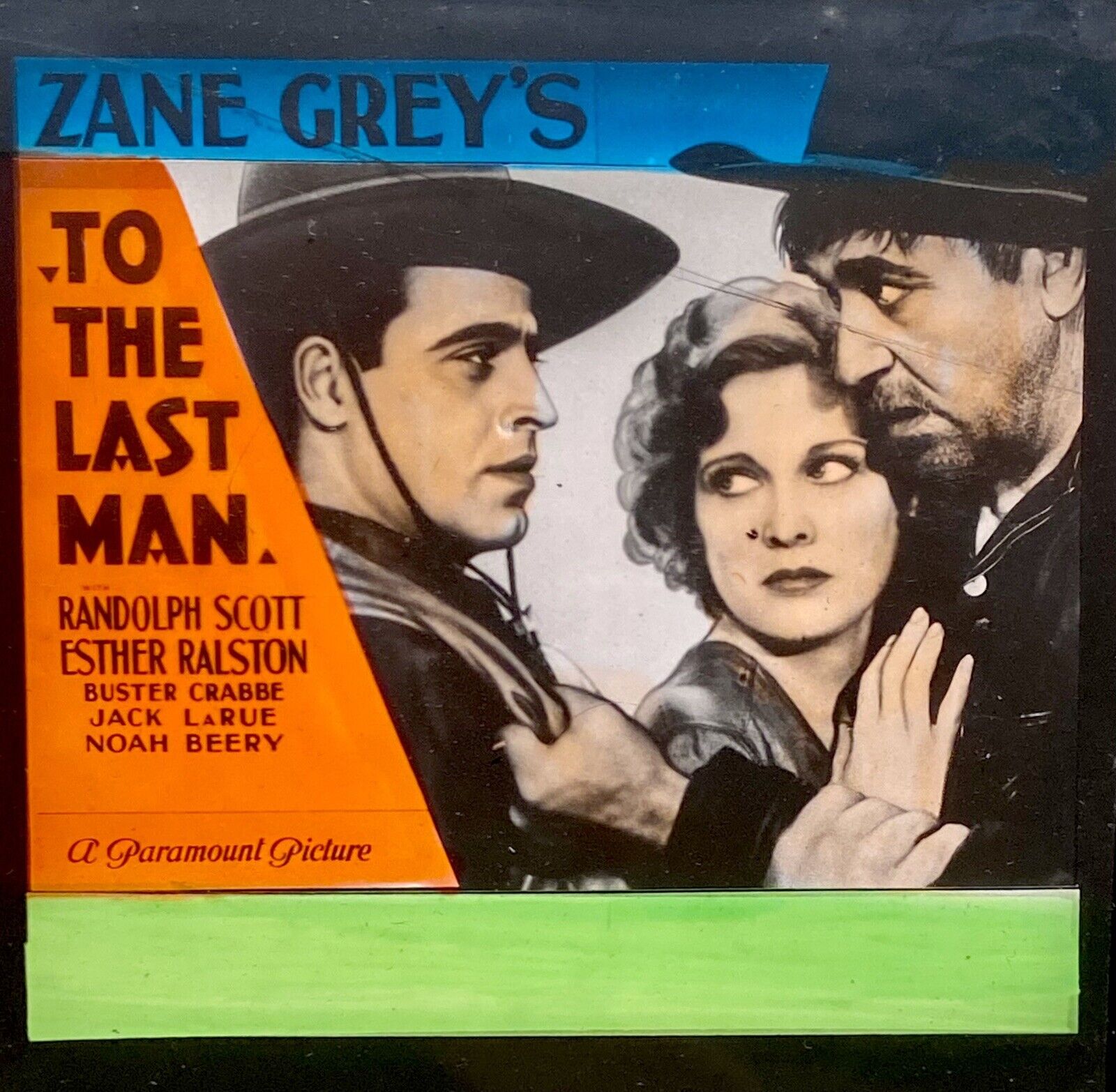Zmdi-facebook
Zmdi-twitter
Zmdi-youtube-play
Zmdi-instagram

TO THE LAST MAN – Vintage 1933 Zane Grey WESTERN Silent Film – MOVIE GLASS SLIDE
$15.31
15
Original/Reproduction: Original
Industry: Movies
Condition: GOOD used shape... Rare original lantern slide with a clean & nice image has a couple cracks
Modified Item: No
An Original American Movie Glass Advertising Slide
Here is an unique opportunity to personally
own a piece of cinema history!
This is a RARE, vintage, coming attraction glass slide
of the original US release of the film from my
extensive personal collection.
This is NOT a reproduction copy or reprint.
It’s a wonderful promotional item that was sent to
theaters to display on the big screen and advertise
the new motion picture release to the public.
Motion Picture Title:
TO THE LAST MAN
Director: Henry Hathaway
Approximate Size in Inches:
3 1/4″ x 4″
Year of Origin:
1933
Movie Studio/Distributor:
Paramount Pictures
Film Stars:
Randolph Scott, Esther Ralston,
Jack La Rue & Noah Beery
Physical Condition:
GOOD
clean & nice image with a couple cracks
This
authentic, “coming attraction” glass slide was designed by the film
studio and printed to promote the first theatrical release of a classic
movie. The hand colored glass slide is ORIGINAL. It is NOT a
reproduction, or commercial item available to the general public. It was
created to be projected on the movie theatre screen before the film was
released, to promote the “coming attraction”. The fragility of glass
slides make those that have survived (especially those in excellent
condition) very rare pieces of film history. Surviving glass slides are
much rarer than the paper poster memorabilia from the same film.
The
graphic image of the slide often duplicates the design of the 11″ by
14″ title lobby card. Sometimes the design uses the graphics of the 22″
by 28″ half-sheet posters.
Movie
glass slides were first made during the early 1910s. They were used to
show “previews” of coming attractions, and were projected before the
films began, and between films of double feature presentations. They
continued to be made through the early 1950s, but were used much less
frequently after movie trailers began to be shown in the 1930s.
Pre-1924
glass slides consist of two panes of glass, each measuring 3/14″ by 4″.
The top pane is the clear cover glass and the bottom pane has the
emulsion of the actual photographic image. The glass panes are held
together with pieces of black tape on the edges of the two panes,
slightly overlapping the front and back. Most post-1924 slides are
“framed” by two pieces of light brown cardboard. The cardboard was
usually stapled together, with the name of the film stamped on the
cardboard edge. Generally the black tape style of slide was used for
silent films, and into the 1930s. The cardboard frame style of slide was
used from the late 1920s, into the 1950s. There is typically a blank
space along the bottom edge of the glass slide. This space allowed
operators/projectionists to manually write in the play dates with a
grease pencil. Slides might typically say “FRI-SAT-SUN”. Such writing
could be easily cleaned off if desired. Its presence does not affect the
value of the glass slide.
Glass
slides are extremely rare, for a number of reasons. The slides were
produced to be sold or leased directly to the movie theater manager or
operator. They were never distributed elsewhere, and certainly would not
have been of interest to others. The slides were produced to be
displayed in movie theaters for a week or two, before the advertised
feature was released. Once the film opened, there was no use for the
slide. The majority of slides were probably discarded shortly after the
film played. Perhaps some were stuffed in a drawer or cabinet and
discarded five, ten, twenty, or more years later. They were not regarded
as collectibles until the 1970s. If they weren’t discarded, they would
have had to survive for sixty, seventy, eighty, or more years. Another
reason for the rarity of glass slides is their fragility. They are
easily damaged. Although slide cabinets existed, at least from the
1950s, most theater operators would not have had them. The condition of
the cardboard frames, and black tape bindings, is not critical to the
desirability of glass slides to collectors. But the condition of the
glass itself is of paramount importance. Glass slides were awkward to
store, and could be easily chipped, cracked, or shattered.
Glass
slides can be projected on walls or screens with vintage projectors or
magic lanterns but NOT by using the more common 35mm slide projectors.
Some people have made illuminated display cases for their slides. I have
been collecting slides for over 25 years, and simply enjoy and
appreciate mine by holding them up to a light source.
There
has been NO restoration or cleaning. The colors are richer and
brighter, and the contrast is sharper, than the poor JPEG image
suggests. If there is any writing in the bottom blank “playdate” area,
it can be easily and completely removed.
Please be aware that my digital camera image may differ
slightly from the actual lantern slide quality due to
exposure/lighting/glares/focus.
Please ask any and all questions prior to bidding/buying.
All payment is due within 3 days of the auction/sale close.
This will be shipped to you flat, safe, sturdy and secure.
Shipping and Handling within the USA will be via USPS Mail.
We ship WorldWide!
Multiple purchases can ship together for postage savings.
Please check my cool ebay store
click here
for Classic Film Items & MORE!











